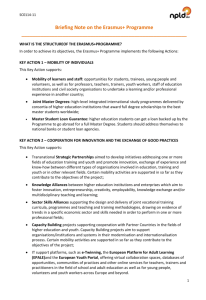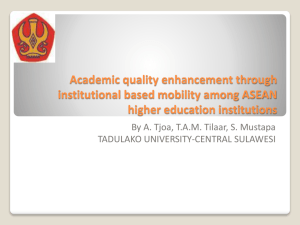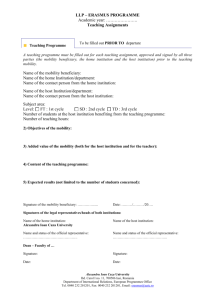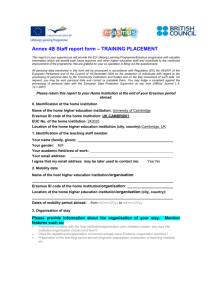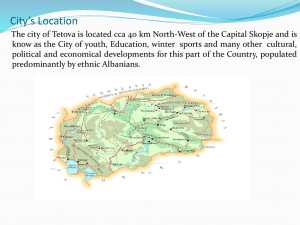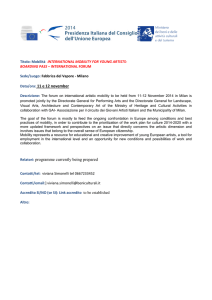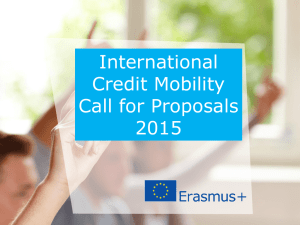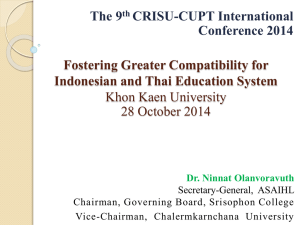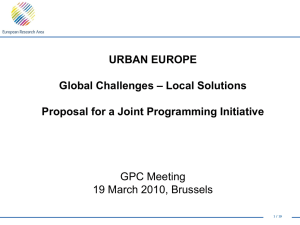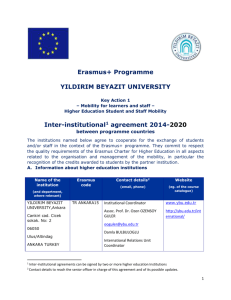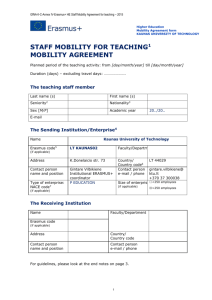Erasmus+ Programme
advertisement
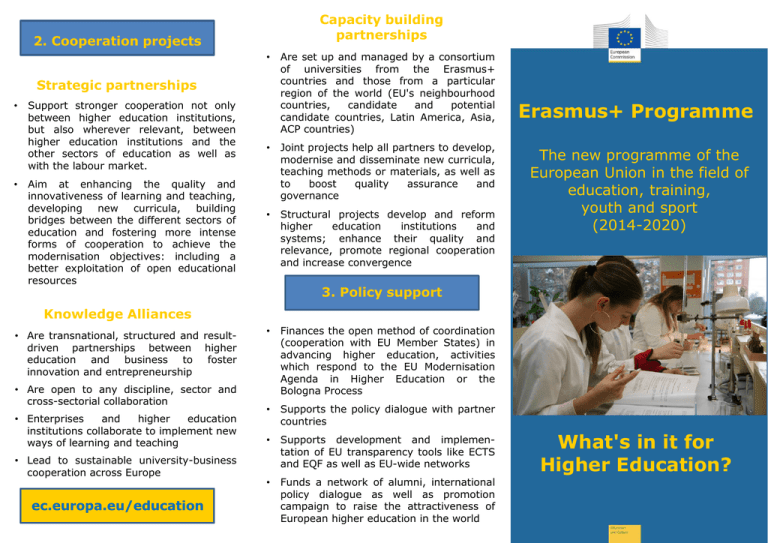
Capacity building partnerships 2. Cooperation projects • Strategic partnerships • • Support stronger cooperation not only between higher education institutions, but also wherever relevant, between higher education institutions and the other sectors of education as well as with the labour market. Aim at enhancing the quality and innovativeness of learning and teaching, developing new curricula, building bridges between the different sectors of education and fostering more intense forms of cooperation to achieve the modernisation objectives: including a better exploitation of open educational resources Are set up and managed by a consortium of universities from the Erasmus+ countries and those from a particular region of the world (EU's neighbourhood countries, candidate and potential candidate countries, Latin America, Asia, ACP countries) • Joint projects help all partners to develop, modernise and disseminate new curricula, teaching methods or materials, as well as to boost quality assurance and governance • Structural projects develop and reform higher education institutions and systems; enhance their quality and relevance, promote regional cooperation and increase convergence Erasmus+ Programme The new programme of the European Union in the field of education, training, youth and sport (2014-2020) 3. Policy support Knowledge Alliances • Are transnational, structured and resultdriven partnerships between higher education and business to foster innovation and entrepreneurship • Are open to any discipline, sector and cross-sectorial collaboration • Enterprises and higher education institutions collaborate to implement new ways of learning and teaching • Lead to sustainable university-business cooperation across Europe ec.europa.eu/education • Finances the open method of coordination (cooperation with EU Member States) in advancing higher education, activities which respond to the EU Modernisation Agenda in Higher Education or the Bologna Process • Supports the policy dialogue with partner countries • Supports development and implementation of EU transparency tools like ECTS and EQF as well as EU-wide networks • Funds a network of alumni, international policy dialogue as well as promotion campaign to raise the attractiveness of European higher education in the world What's in it for Higher Education? Student degree mobility – joint degrees 1. Learning Mobility Investing in education and training is the key to unlocking people’s potential, regardless of their age or background; it will help them to increase their personal development, gain the skills needed now and in the future on the labour market and boost their job prospects. From 7 existing programmes to a streamlined single integrated programme • The popular Erasmus student credit mobility will include an international component with mobility from and to partner countries world-wide for the first time • Study period for studies: 3 up to 12 months • Traineeship period: 2 up to 12 months • Grants available in each of the three cycles (short-cycle / bachelor, master and doctorate); in all disciplines and even as a combination of study and traineeship • Recent graduate mobility: traineeships supported within one year of graduation Staff mobility • Erasmus+ • 1. Learning Mobility Specific activities: • Jean Monnet • Sport The popular Erasmus Mundus master courses will continue under the new programme. The joint doctorate courses will be continued within the Marie Skłodowska-Curie Actions under the Horizon 2020 Research Programme • Joint Master Degree courses of excellent quality are offered by consortia of programme countries and (possibly) partner country universities to attract the best students worldwide • Students will be able to follow a master study programme in at least two programme country institutions, receive attractive scholarships and obtain joint degrees Student credit mobility covering all education sectors and youth 2. Cooperation projects • 3. Policy Support Staff from higher education can go abroad to teach or to be trained Mobility period: between 2 days (excluding travel days) and 2 months and a minimum of 8 teaching hours of lecturing abroad • Staff from enterprises can be invited to teach at higher education institutions • Minimum stay is extended to 5 days in the case of mobility to or from partner countries Student degree mobility – loan guarantee • Students will be able to apply for a loan under favourable pay-back terms for a full master degree abroad • Students can borrow up to 12,000 € for a one-year master course and up to 18,000 € for a two-year master course • Students should address themselves to national banks or student loan agencies
